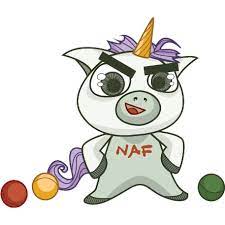Hi everyone, a quick note before we get started. If you’re in Seattle and available the evening of October 26th, please join me at the Museum of History and Industry (MOHAI) for a book reading I’m doing of my book, Unicorns on Fire, which is a collection of some of my favorite blog posts, but in print. It’ll be fun. We’ll be sharing scary nonprofit stories, taking photobooth pictures, and giving out NAF merch as door prizes. It’s free. Register here so we know how much hummus to buy for the hummus bar.
If you work in this sector, you’ve probably experienced your fair share of bizsplaining. This is a term my friend Allison Carney coined where someone from the corporate sector who often has little to no nonprofit experience, talks down to nonprofit professionals. It manifests in several ways, including, but not limited to:
- Criticizing nonprofits by comparing them with for-profits: “Nonprofits leaders are so disorganized, unlike all these amazing, highly competent leaders who run businesses.”
- Assuming their experience in for-profit makes them qualified to school nonprofits: “I retired from a 40-year career in banking. I’d love to mentor a nonprofit leader or two.”
- Believing nonprofit work is easier than for-profit work: “Being a corporate lawyer has been so stressful. Sometimes I daydream about quitting and starting my own nonprofit.”
- Using corporate terms and concepts as if we’ve never heard of them: “Have you heard of revenues projection?”
- Insisting that nonprofits be more like for-profits: “Nonprofits should be more like for-profits.”
- Believing volunteering or using nonprofits makes them expert: “I’ve been a board member of several nonprofits, so I know how to run one. That’s why I’m applying for this ED position.”
- Arguing about nonprofit issues as if the bizsplainer’s opinions about them are as equally valid as the opinions of someone in nonprofit: “I disagree. I think nonprofits should all be forced to pay taxes.”
- Ignoring glaring issues in for-profits: “Wow, nonprofits have a unique problem of people of color quitting.”
- Believing for-profits are the solutions for every problem: “Nonprofits should just all go out of business and let social enterprises take over solving social issues.”
- Being unable to detect irony, such as understanding the problems caused by for-profits: “Maybe if nonprofits acted more like for-profits, they’d be more successful at solving issues like poverty and homelessness.”
I’m sure there’s plenty of other categories. It’s weird. It’s rare when nonprofit folks have the same patronizing attitude toward for-profits. There are probably a few nonprofit people who have no experience in another field saying something like, “I’ve never run a restaurant before, but I have eaten at several, and I think you need to consolidate with other restaurants in your neighborhood into one mega-restaurant, to lower overhead costs” or “When I’m retired from my career in youth development, I’d love to open my own medical practice. It seems so rewarding!”
But that’s not common. Most of us don’t go butting into the intricacies of medicine, law, architecture, engineering, or underwater welding with the same breathtaking combination of arrogance and ignorance that many for-profit people come at us with. And none of this is to say that there are no good for-profit folks who enter the nonprofit sector and become awesome; there are, and their secret is that they’re humble enough to put aside their ego and learn from the folks who have been here in the sector for a while.
If you’re dealing with a bizsplainer, it can be exhausting, frustrating, and sometimes bewildering. Some bizsplainers mean well but just don’t realize how condescending and ridiculous they’re being. Think of them like adorable toddlers with LinkedIn accounts who are learning the ways of the world. If you have the time and patience, feel free to help educate. Remember, not everyone has had the same experience we do, and society does not do a very good job educating people on the intricacies of nonprofit dynamics. It does the opposite, which is to further misinformation, such as on overhead, etc.
So unless it’s obviously otherwise, assume at first that the bizsplainer is well-meaning, and calmly provide context, statistics, and counterarguments. One time, a bizsplainer said to me, “You nonprofits all should sell things to earn revenues. Like my church. It sells sausages each weekend.” I calmly explained how earned revenues can be great but is not realistic for most nonprofits. He took it well.
The real issues are with the bizsplainers who are trolls and who like riling people up. Here are some tips and tricks I’ve learned over the years:
Remain calm: Trolls like to wind people up, and the more irritated you are, the more gleeful they get. They can sense when their prey is flustered, and they will attack. Don’t engage with them as if they were rational human beings who are open to change, because most of the time, they’re not.
…









